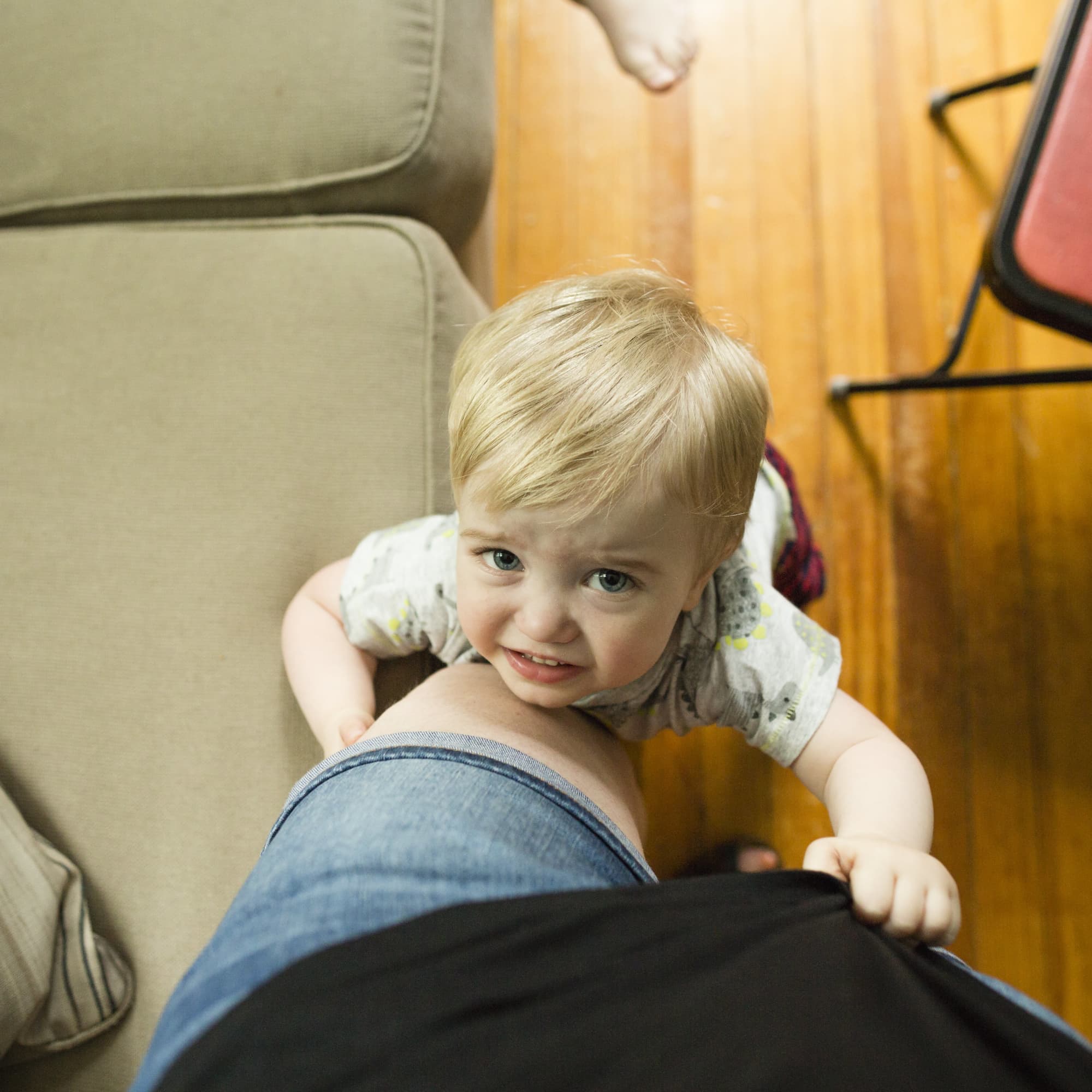
- POPSUGAR Australia
- Living
- Why Does My Toddler Make Me So Mad? Here’s What a Child Psychologist Has to Say
Why Does My Toddler Make Me So Mad? Here’s What a Child Psychologist Has to Say

My face is red, my heart is racing, my ears are practically blowing steam. “Take a deep breath, it’s going to be OK,” I tell myself. “He’s just 3-years-old.” I give myself a version of this pep talk daily because sometimes my kids make me So. Freaking. Mad. Is that OK to admit?
Why is it that the tiniest humans – just 3 and almost 2 – know how to push my buttons and ruffle my feathers (*insert another cute but totally inadequate euphemism here*) in a way that makes me so completely and totally rage-filled? Surely, they don’t fully grasp how angry they can make their mom, but sometimes it seems like they are doing it on purpose. Especially when they color on the walls or throw their food on the ground or push their siblings. I know you did not just get out of your bed again. I know you aren’t smiling in timeout. I know you did not just say you don’t like TV when I threatened to turn it off if you didn’t pick up your toys. Kids, amirite?
But, since yelling at kids has been proven to increase their aggression, and it doesn’t make me feel very good either, I try my best to stay calm. POPSUGAR talked to a child psychologist to learn more about this annoying phenomenon – and tips on keeping your cool.
Related: Dear Husband, This Is Why I’m Always Angry
Is it Normal That Toddlers Make Their Parents so Mad?
After talking to my mom, aunt, best friend, and parents on social media, I know that it’s common to experience these occasional angry feelings toward toddlers. Sometimes, it helps to vent to other adults about the annoying things your kid does – you may just end up laughing about it!
Janine Domingues, PhD, a clinical psychologist at the Child Mind Institute, told me that the challenges I face with my toddler and the feelings of frustration is something that many parents face. “You are not alone,” she said. “Developmentally, a toddler’s brain is developing and changing at rapid speed, and that comes with exhibiting intense emotions, acquiring language, and yet not having the full capability of expressing what they want or need. Toddlers are starting to exhibit the desire for autonomy and yet don’t have the capability to problem solve or prioritize. Toddlers can be easily overwhelmed, not have the ability to regulate emotions, and have difficulty waiting. All to say, it makes sense why this time period in child development can be a challenging one for parents.”
Furthermore, stress, anxiety, and depression are all rising right now due to the pandemic. Toddlers are not exempt from the craziness going on in the world! “Stressors related to the pandemic, including working from home, daycare inconsistency, difficulty with routine and predictability, lack of socialization and support, can all exacerbate an already challenging time,” added Dr. Domingues.
Do Toddlers Make Parents Mad on Purpose?
Without a doubt, my kids have deliberately done something I told them not to do, screamed at me, threw tantrums in the middle of the grocery store, and countless other things that makes me want to pull my hair out. But, whether you can believe it or not, Dr. Domingues stresses that they are not doing this to purposely make us mad.
“When a toddler exhibits behavior that can feel frustrating to us as parents, it might be because that behavior is providing the toddler with attention, the behavior may be soothing and providing them with a sensory experience they desire, the behavior may be getting the toddler an activity or toy they desire, or the behavior may be allowing the toddler to escape something they don’t want to do,” explained Dr. Domingues.
When we understand why our toddlers make us mad, it will help us figure out what to do to decrease the behavior. For example, when I’ve been working a lot, I notice my oldest son will purposely take toys away from his brother or push him – then immediately look at me and smile. This reminds me that he just wants attention, so I try to take more breaks throughout the day to give it to him. Afterward, he’s always happier playing alone again.
Related: When I’m So Angry at My Kids I Could Burst, I Take a Moment to Remember Better Times
How Can Parents Calm Down When We Get Mad at Our Toddlers?
Lately, when I feel myself getting mad at my kids, I like to give myself a timeout. I’ll go to the bathroom for a few minutes to breathe or call my husband to takeover while I read for a minute in another room. Actively breathing and visualizing yourself calming down will help manage anger. For me, I need to get physical distance from my kids before I lose my temper in front of them. I also like to remind myself that I am modeling behavior for them, so if I can calm down, they will learn how to calm down too.
Dr. Domingues agreed that it’s important to take a step back when you feel angry with your kids, and you should also explain how you’re feeling. “In the moment when you are feeling frustrated or angry, it’s OK to model labeling how you feel and stepping away for a few minutes to calm down,” she said. “Saying something like, ‘I’m feeling angry and I’m going to take some deep breaths’ is a way to model the labeling of emotions and pairing it with a coping skill of what to do in the moment.”
Additionally, it’s important to try to focus on the positives and build happy memories with your kids too. Spend time each day cuddling or playing their favorite game with them. Talk to them about their day. Read to them. “While it may be difficult to find the time to do this, carving out at least five minutes each day to spend positive one-on-one time with your toddler is a way of utilizing the strength of your relationship to help you feel calm and your toddler feel secure and calm,” said Dr. Domingues.
Finally, don’t be afraid to reach out for help. “Find and utilize your support system,” Said Dr. Domingues. “Talking about how you feel as opposed to holding it all in will help you to feel connected and also turn down the intensity of how you feel. Lastly, do not hesitate to reach out for professional help. There are useful resources for effective parenting strategies especially during toddlerhood – you don’t have to figure it out alone.”
It’s OK to be mad at your kids every now and then, but you don’t have to let it consume or overwhelm you. Take a break, vent to a friend, or call your therapist. We are teaching our little ones how to react to situations and manage their emotions, so it’s important to calm down and model healthy behavior. You can always call them little sh*ts afterwards to your loyal mom friends (we’ve all been there!).


